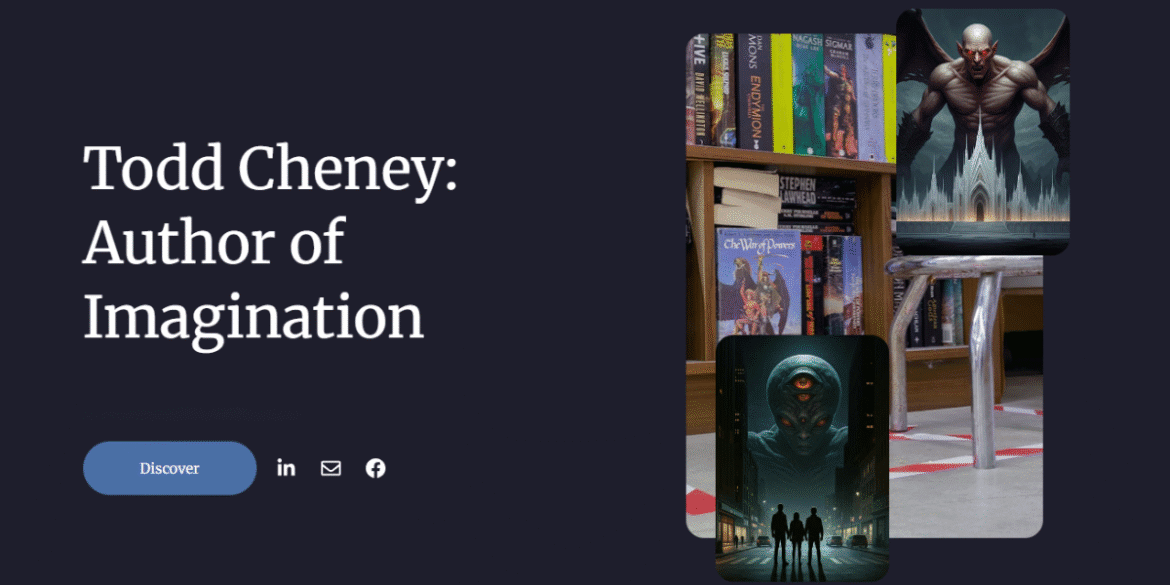Todd Cheney transforms bipolar struggles into fuel for fantasy and sci-fi worlds, proving imagination can turn pain into powerful stories.
Todd Cheney was twenty-two years old, living in a modest apartment in southeastern Wisconsin, when he finished typing the last sentence of his first novel. Outside his window, the suburbs stretched quietly under a gray November sky. Inside, something extraordinary had just happened, a young man wrestling with the early signs of what would later be diagnosed as bipolar disorder had discovered that the storms in his mind could become fuel for entire universes.
That was 2003. The novel was The Seventh Circle, and it marked the beginning of a literary journey that would span over two decades, produce more than a dozen books, and prove that creativity doesn’t just survive mental illness, sometimes it transforms it into something powerful.
“I’ve always been fascinated with art and different forms of self-expression,” Cheney reflects today from his home in Brookfield, Wisconsin, the same suburb where he grew up reading voraciously as a child. What he doesn’t immediately mention, but what colors every page he’s written since, is how writing became more than self-expression. It became survival.
The path from that first novel to his latest work, The Immortal Pill, released in September 2024, hasn’t followed any traditional publishing playbook. There were years when the discrimination he faced for his mental health condition cost him jobs, stability, and sometimes hope. There were rejections that felt personal, episodes that derailed momentum, and moments when giving up would have been the logical choice. But logic has never been Cheney’s strongest guide, imagination has.
His latest novel presents a darkly satirical near-future where a corporation called LonGev offers immortality for $218,579.12 per year. The premise, a miracle pill that promises centuries of life, complete with a free two-week trial, serves as both science fiction thriller and sharp social commentary. In true Cheney fashion, the story balances its high-concept premise with deeply human struggles. A young woman in a trailer park searches for her past while the world around her grapples with the ultimate question: what price would you pay to never die?

The novel joins an impressive catalog that includes the four-book Seventh Circle fantasy saga (The Seventh Circle, The Rhythm of Nature, Emperors of Darkness, and Soulstone), the contemporary fantasy The Bracelet, the science fiction novel Risen, and several other works including Time Knight and the upcoming Earthborn, the first book in his Cosmic Destiny series. He’s even written a guide for aspiring writers, Conquer Your Story: How to Write Fiction, sharing the techniques that helped him channel his experiences into narrative.
What makes Cheney’s work distinctive isn’t just the volume or the variety, it’s the emotional intensity that reviewers consistently note. Kirkus Reviews has praised his storytelling. Amazon reviewers describe being grabbed by his plots and relating deeply to his characters. Screenwriters have expressed interest in adaptations. These aren’t the typical accolades for someone society might write off because of a mental health diagnosis.
“I just have more heart and intensity in my stories,” Cheney says simply when asked what sets him apart from other science fiction and fantasy authors. That intensity comes from somewhere real, from nights when his mind raced with possibilities both terrifying and beautiful, from mornings when getting to the keyboard felt like climbing a mountain, from the constant push-and-pull between the chaos inside and the worlds waiting to be born.
The discrimination he’s faced hasn’t just been abstract. Jobs lost, opportunities denied, assumptions made, these are the realities of living with mental illness in America. But where others might see only obstacles, Cheney found raw material. His characters often grapple with feeling different, misunderstood, or fighting systems bigger than themselves. In The Immortal Pill, the protagonist searching for her identity while corporations peddle false promises of perfection feels especially resonant.

Today, Cheney participates in editing and critique groups, connects with readers through online book communities, and continues producing new work at a remarkable pace. Prison Ship is slated for release in late 2025, adding another title to his growing bibliography. Each book represents not just a story told, but a victory earned, proof that the mind that society fears can be the same mind that creates worlds readers don’t want to leave.
The boy from Brookfield who fell in love with reading has become the man who refuses to stop writing, even when the world gives him every reason to. His mental illness isn’t a footnote to his story or something to overcome and forget. It’s woven into the fabric of his creativity, informing the emotional depth and innovative premises that make his work resonate. The battles continue, but so do the books.
For readers seeking science fiction and fantasy with genuine emotional weight, for anyone who’s ever felt different or dismissed, for those who understand that the most interesting stories often come from the most complicated minds, Todd Cheney’s work offers something rare: proof that our struggles don’t define our limits. They can, sometimes, reveal our powers.
Discover Todd Cheney’s imaginative worlds at his website, explore his complete catalog on Amazon, follow his writing journey on X @toddcheneywrite, and dive into his latest novel The Immortal Pill , where immortality comes with a price tag, but the real cost might be your humanity.

